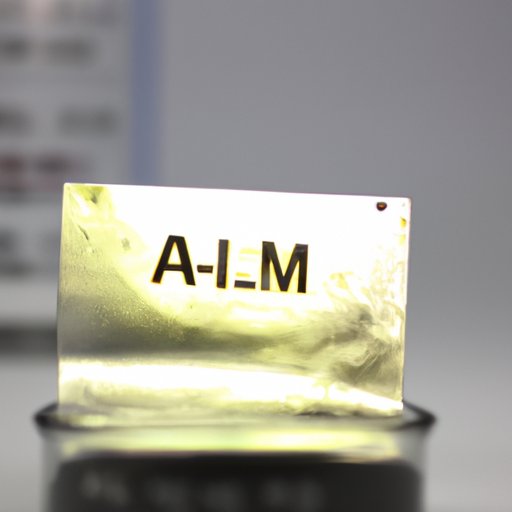Introduction
Solubility is an important concept used to describe how well a substance can be dissolved into a liquid or solution. It is a physical property that determines whether a solid, liquid, or gas can dissolve in a specific solvent. In this article, we will explore the properties of solubility and examine if aluminum is soluble in different solutions.
Aluminum is one of the most abundant elements found in nature. It is a silvery-white metal with a shiny surface and is highly malleable. It is lightweight and has excellent electrical and thermal conductivity. Aluminum is also non-toxic, corrosion resistant, and has a high reflectivity rate.
Exploring the Properties of Solubility: Is Aluminum Soluble?
When it comes to solubility, there are three main types of solutions: water, alcohol, and other organic solvents. Depending on the type of solution, aluminum may or may not be soluble in it. Let’s take a closer look at the solubility of aluminum in each type of solution.
An Overview of Aluminum’s Solubility in Different Solutions
In water, aluminum is only slightly soluble. At room temperature, the solubility of aluminum hydroxide (Al(OH)3) is 0.0017 g/L. However, when the temperature increases, the solubility of aluminum hydroxide increases as well. At 100°C, the solubility of aluminum hydroxide is 0.076 g/L.
In alcohol, aluminum is much more soluble than in water. At room temperature, the solubility of aluminum hydroxide in ethanol is 0.28 g/L. This is significantly higher than the solubility of aluminum hydroxide in water at the same temperature.
In other organic solvents, the solubility of aluminum varies depending on the solvent. For example, aluminum is highly soluble in acetone but insoluble in ethylene glycol. The solubility of aluminum in organic solvents is usually lower than its solubility in water and alcohol.
Examining the Unique Characteristics of Aluminum and its Solubility
Aluminum has some unique characteristics that make it soluble or insoluble in different solutions. One of these characteristics is its amphoteric nature. This means that it can act as both an acid and a base, depending on the solution it is in. This affects its solubility in different solutions, as acids and bases can have different levels of solubility.
Another factor that affects aluminum’s solubility is its ability to form complexes. Aluminum can form complexes with a variety of molecules, such as water, alcohols, and organic solvents. These complexes can influence the solubility of aluminum in different solutions.
Analyzing the Effects of Temperature on Aluminum Solubility
Temperature can also affect the solubility of aluminum in different solutions. As temperatures increase, the solubility of aluminum increases as well. This is due to the fact that, at higher temperatures, the solubility of solids in liquids tends to increase.
The effects of temperature on aluminum solubility can also be explained by examining the chemical reactions involved. When aluminum is heated, it forms aluminum ions (Al3+) which are more soluble in solution than the solid form of aluminum. This explains why the solubility of aluminum increases as the temperature increases.
Conclusion
In conclusion, aluminum is a versatile element that can be soluble or insoluble depending on the type of solution it is in. In water, aluminum is only slightly soluble. In alcohol, aluminum is much more soluble. In other organic solvents, the solubility of aluminum varies depending on the solvent. Temperature can also affect aluminum’s solubility, as the solubility of aluminum increases as the temperature increases.
This article has discussed the properties of solubility and how they affect aluminum. Further research should focus on understanding the chemical reactions involved in aluminum solubility and investigating the effects of other factors, such as pH, on aluminum solubility. Additionally, tips for solving problems related to aluminum solubility should be explored.

